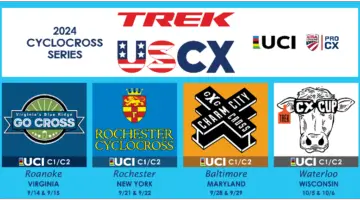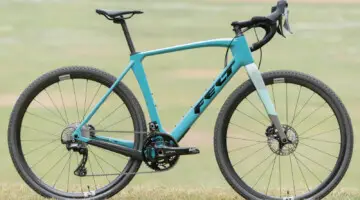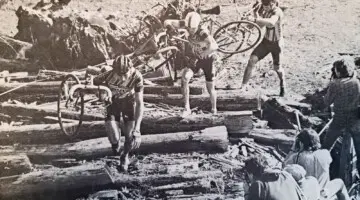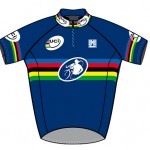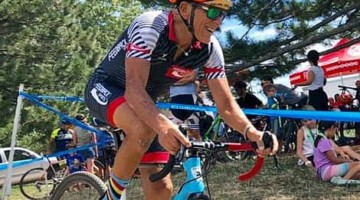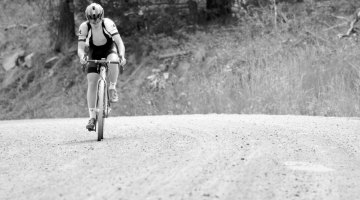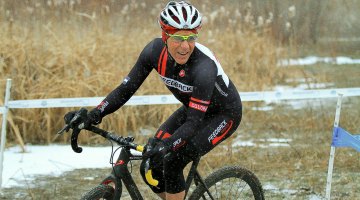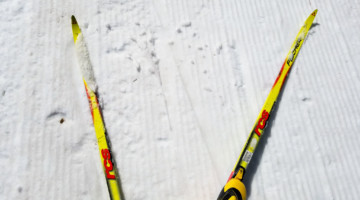Masters racer Lee Waldman comes to us this week with part two of his reflections on Masters Worlds and his hope to perform well at Loiusville next year. This week, Lee puts his question to the racers that were there and brings us the following interview. Lee’s previous column encouraged some lively debate, so be sure to check it out if you missed it!
by Lee Waldman
The 2010 edition of Masters Worlds is now history. What does that mean for us here in the US? If your plans for next season target Louisville, it simply means now is the time to start preparing. As a teacher I’m a big believer in planning. And what’s good for me professionally always seems to apply to the rest of my life as well. Although, sometimes the results aren’t necessarily positive: a couple of years ago my wife put a ban on my pre-planning our weekends. It seems that I had this propensity to think about Friday on Monday afternoon. So, ok, maybe there’s limits, but when thinking about ’cross racing I still maintain that there’s no such thing as over planning.
So with Louisville in mind I contacted a few of the US masters racers who made the trip to Belgium this year, seeking information. I was curious about their experience there and I also wanted to pick their collective brains to help me prepare. Two of the riders, Peter Webber and Brandon Dwight, are fixtures in Colorado racing. In the 40-45s World Championships, Pete Webber took fourth, Brandon Dwight sixth, and four other Americans made the top twenty. Steve Tilford earned third in the 50-55. Dan Seaton lives and races in Belgium, writing about European cyclocross for Cyclocross Magazine. There’s been so much written already about Mol that I wasn’t sure exactly what I could provide to you that hasn’t already been written about. So I decided to simply ask these four my burning questions. My goal: to provide my readers with a hopefully different look at masters racing at the highest level. I’m not quite sure if I succeeded, but hopefully I’ve provided you with food for thought as you look towards next season.
Never having had the experience of racing outside of this country myself, I was really interested in the differences between European ’cross and our version. How exactly does racing in Belgium compare with racing here?
Peter Webber: The essential components of the races are basically the same, and racing in the US has matured to a level where the courses, riders, and organization are pretty similar to Belgium. The differences depend on which category you race, and which event you are looking at for comparison. The big, elite Belgian “A” ’crosses, like Superprestige and GVA, are on a much higher level than anything we have in the US. But the “B” ’crosses that include masters and elite-without-contract are not as crazy. Just like in the US, each race in Belgium can have a different level of competition, different style of course, and different conditions.
Dan Seaton: The race in Mol lacked the physicality of the typical, very heavy courses in the west part of Belgium, and wasn’t much of a technical challenge compared to many races I’ve done here (Races here can be downright scary sometimes compared to American courses).
To compare it to an American race, I’d say it was a little bit like Northampton in terms of the appearance of the terrain – with the course winding around through the woods in a kind of park – and kind of like Gloucester in terms of difficulty.
Steve Tilford: This was not a big event in Belgium cyclocross. The race in Louisville is going to be much bigger.
So, it’s pretty different there. No big surprise. But what, I wondered, would help us better prepare. How could promoters here do a better job of designing courses that would measure up to the standards set in Belgium?
Brandon Dwight: I think we need more technically demanding courses, with tough climbs, sketchy downhills and deep rutted corners. More mud and sand would be better, too. Learning to power through mud and sand is key if you want to be a successful racer in Europe.
Peter Webber: The courses are generally more difficult in Europe and the weather conditions are more extreme. Dramatic steeps are often a key element. But even in flat terrain, the courses can be pretty challenging due to severe mud, sand, ruts, ditches, and bumpiness.
Steve Tilford: The main difference was the sand. We don’t have sand like that here in the States. Not that consistency. It is something that you would have to be very good at to win the race. That was the difference for most of the American riders competing to win their events. None of us rode the sand as well as the winning Belgian riders.
There seemed to be some differing of opinion as to how many, if any, European riders would make the trip to Louisville. Whether they do or not, I’m curious about the differences. After all, Worlds are only here for two years and then I may just have to make a trip outside of our borders to race ’cross. What should I expect?
Peter Webber: Overall, the riders in Belgium and Holland are stronger and more experienced. They can ride all types of courses and they don’t make mistakes. You won’t see them crash, or have mechanicals. They know how to tackle everything and ride smooth all the time. Their bikes and wheels are totally dialed, they have meticulous preparation, and they have excellent race tactics. Many of these guys have decades of experience, and have done something like 300-plus races in their career. Even the juniors have 50 or 100 races under their belt.
Dan Seaton: The best guys were extremely fast. Here in Belgium I regularly race with some guys who a couple of years ago were doing Superprestige and GVA Trofee races and doing pretty well. These guys would probably be top ten finishers in all but the biggest elite races in the US; they’re really fast. I don’t think any of them made the podium in Mol. You know that if Pete Webber misses the podium that they’re going fast, and in the younger categories they’re even faster. I assume that some of these top finishers will come over to the US next year, so it should be a blazingly fast race for everybody.
If the Euro guys do come over, I’d say that anybody who is not finishing on the podium in their category at nationals needs to set reasonable goals for the race; winning is likely out of the question.
Brandon Dwight: Some guys are fast, some guys are slow, but they are all there because they love everything about the culture of cyclocross racing.
How would you advise riders here to train and plan their season if they want to perform well at worlds?
Brandon Dwight: Well, next year will be easier with US Nationals being later in the season. But, when it’s late in the season, I feel that it is important to ride as little as possible, but keep your peak intensity level tuned up. Short rides with short intervals, and lots of easy spins work well for me.
Peter Webber: US masters who are targeting Louisville will need to adjust their training and racing schedules to peak in January instead of the customary December peak. In my experience, this is very difficult to achieve and many riders are going to have a tough run. Currently, lots of US racers are toasted by Nationals and not in a good position to add 6 weeks of training and racing. The transition to the new schedule is going to be pretty difficult.
Your thoughts on the race, the course, the organization, the riders?
Peter Webber: The Worlds at Mol is a well-run event and the organizers have done a good job for more than 10 years. But it has been a fairly straight-forward event, without much fanfare or special features. The course is great, but there is no expo, no parties, no marching bands or superfans. I’m pretty certain that Louisville is going to blow the top off the previous event format. We’ll have to wait and see what the level of competition is, however.
Dan Seaton: No pre-registration was necessary, so all you had to do was show up, show your UCI license, and get a number.
Brandon Dwight: The US Nationals Masters field is five times as large as the Worlds field. Masters Worlds has always been a much smaller event than I think people in the US realize. Remember, Masters Worlds have been held in Mol, Belgium for many years and Belgium is the size of Maryland, so there really aren’t that many Belgian Masters racers and even less from other European countries. But, for what Europe lacks in quantity of Masters racers, it makes up for it with quality. The top guys are fast and skilled!
What about the crowds?
Brandon Dwight: Crowds at bike races are usually relative to the size of the racer fields. Since Masters Worlds has less racers (no juniors, no U23, no elite) the crowds are smaller. The crowds at US Nationals at Bend, OR were far larger, and far more rambunctious than the crowds at Mol, Belgium. Now, at an elite level World Cup; that is a whole other story!
What should we hope to be different next year in Louisville?
Peter Webber: Start position at Masters Worlds in the past has been determined at random. And start position made a big difference on the Mol course with a shortish start/finish straight followed by a ninety-degree turn into 200 meters of beach. And it wasn’t even technically random. It appeared to me that the officials just selected a number to start with, and then called up riders in order from there.
It is pretty weak to use random start position at a championship event. Imagine traveling 5,000 miles to race knowing that a bad draw could sink your day before the gun even goes off? So I think it is essential they develop a better method for Louisville. Lacking any formal international ranking system, a time trial is probably the best method.
Dan Seaton: Because the race was in Belgium, they didn’t have the huge influx of not-especially-fast guys who just wanted to say they raced in a World Championship – in other words, racers not unlike me – that I suspect they’ll have in Louisville. That’s something the organizers are going to have to think hard about. European ’cross races rarely have more than 50 or 60 people in each category, which is a reasonable number. I imagine that in Louisville they could end up with huge numbers of racers, most of whom have little hope of winning and will get in the way of the serious contenders. They will need to have a plan to handle this.
Other thoughts?
Brandon Dwight: I would recommend to any cross enthusiast looking for the pure European ’cross experience to make the trip and race for a couple of weeks. Take in the culture, ride the narrow cobbled roads, drink the beer, eat the frites, race hard and taste some Belgian mud.
Steve Tilford: Not many times in a person’s life do they have the opportunity to compete in the World Championships. It would have been nice winning the World Championships of cyclocross in Belgium, just because Belgium and cyclocross are nearly synonymous. But, winning here in the United States wouldn’t be too bad either.
Dan Seaton: If the Euro guys do come over, I’d say that anybody who is not finishing on the podium in their category at nationals needs to set reasonable goals for the race; winning is likely out of the question.
Peter Webber: I totally recommend all ’cross junkies in the US make a trip to Europe at some point. The whole experience is so much fun and challenging. No matter what age or ability you are, there are races that will match your level.
So, there it is. Food for thought as we all reflect back on last season and begin to define a fresh set of goals for 2011-12. We can enjoy Louisville for the next two years and then, for those of us with the time, the means and the inner drive, we now have a bit more information about how to prepare to race in Europe.
Time to go ride.








